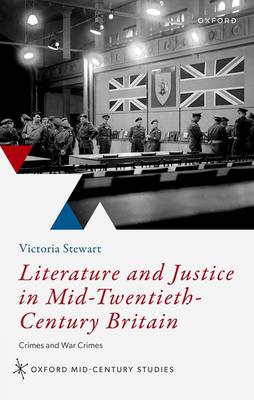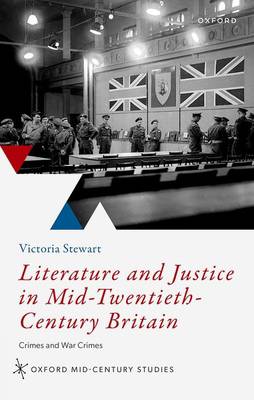
Door een staking bij bpost kan je online bestelling op dit moment iets langer onderweg zijn dan voorzien. Dringend iets nodig? Onze winkels ontvangen jou met open armen!
- Afhalen na 1 uur in een winkel met voorraad
- Gratis thuislevering in België vanaf € 30
- Ruim aanbod met 7 miljoen producten
Door een staking bij bpost kan je online bestelling op dit moment iets langer onderweg zijn dan voorzien. Dringend iets nodig? Onze winkels ontvangen jou met open armen!
- Afhalen na 1 uur in een winkel met voorraad
- Gratis thuislevering in België vanaf € 30
- Ruim aanbod met 7 miljoen producten
Zoeken
€ 177,45
+ 354 punten
Omschrijving
Literature and Justice in Mid Twentieth Century Britain: Crime and War Crimes examines how ideas about crime, criminality, and judicial procedure that had developed in a domestic context influenced the representation and understanding of war crimes trials, victims of war crimes, and war criminals in post-Second World War Britain. The representation of Belsen concentration camp and the subsequent British-run trial of its personnel are a particular focal point. Drawing on a range of source material including life-writing, journalism, and detective fiction, as well as criminological and sociological works from this period, this book explains why the fate of the Jews and other victims of the Nazis was sometimes brought starkly into focus and sometimes marginalised in public discourse at this period. What remain are glimpses of the events now called the Holocaust, but glimpses that can be as powerful and as meaningful as more direct or explicit representations.
Specificaties
Betrokkenen
- Auteur(s):
- Uitgeverij:
Inhoud
- Aantal bladzijden:
- 224
- Taal:
- Engels
- Reeks:
Eigenschappen
- Productcode (EAN):
- 9780192858238
- Verschijningsdatum:
- 19/04/2023
- Uitvoering:
- Hardcover
- Formaat:
- Genaaid
- Afmetingen:
- 145 mm x 208 mm
- Gewicht:
- 385 g

Alleen bij Standaard Boekhandel
+ 354 punten op je klantenkaart van Standaard Boekhandel
Beoordelingen
We publiceren alleen reviews die voldoen aan de voorwaarden voor reviews. Bekijk onze voorwaarden voor reviews.











